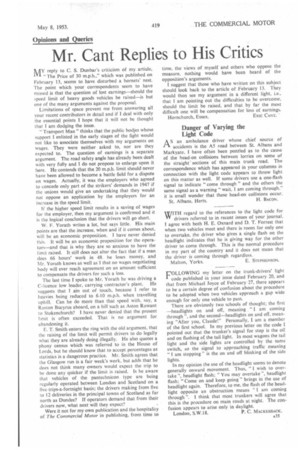Mr. Cant Replies to His Critics
Page 45

If you've noticed an error in this article please click here to report it so we can fix it.
NAY reply to C. S. Dunbar's criticism of my article,
The Price of 30 m.p.h.," which was published on February 13, seems to have disturbed a hornets' nest. The point which your correspondents seem to have missed is that the question of lost earnings—should the speed limit of heavy goods vehicles be raised—is but one of the many arguments against the proposal.
Limitations of space prevent me from answering all your recent contributors in detail and if I deal with only the essential points I hope that it will not be thought that am dodging the issue.
"Transport Man" thinks that the public bodies whose support I enlisted in the early stages of the fight would not like to associate themselves with my arguments on wages. They were neither asked to, nor are they expected to. The question of earnings is a separate argument. The road safety angle has already been dealt with very fully and I do not propose to enlarge upon it here. He contends that the 20 m.p.h. limit should never have been allowed to become a battle field for a dispute on wages. Actually, it was the employers who agreed to concede only part of the strikers' demands in 1947 if the unions would give an undertaking that they would not oppose an application by the employers for an increase in the speed limit.
If the higher speed limit results in a saving of wages for the employer, then my argument is confirmed and it is the logical conclusion that the drivers will go short.
W. F. Yorath writes a lot, but says little. His main points are that the increase, when and if it comes about, will be an economic proposition. I have never denied this. It will be an economic proposition for the operators—and that is why they are so anxious to have the limit raised. It still does not alter the fact that if a man does 66 hours' work in 48. he loses inoney, and Mr. Yorath knows as well as 1 that no wages negotiating body will ever reach agreement on an amount sufficient to compensate the drivers for such a loss.
The last time I spoke to Mr. Yorath he was driving a C-licence low loader, carrying contractor's plant. He suggests that I am out of touch, because I refer to heavies being reduced to 6-10 m.p.h. when travelling uphill. Can he do more than that speed with, say, a Ruston 'Bucyrus aboard, on a hill such as Aston Rowant to Stokenchurch? I have never denied that the present limit is often exceeded. That is no argument for abandoning it.
E. T. Smith enters the ring with the old argument, that the raising of the limit will permit drivers to do legally what they are already doing illegally. He also quotes a phony census which was referred to in the House of Lords, but he should know that to accept percentages as statistics is a dangerous practice. Mr. Smith agrees that the Glasgow run is a fair week's work, but adds that he does not think many owners would expect the trip to be done any quicker if the limit is raised. Is he aware that vehicles of the pantechnicon type are being regularly operated between London and Scotland on a five-trips-a-fortnight basis; the drivers making from five to 12 deliveries in the principal towns of Scotland as far north as Dundee? If operators demand that from their drivers now, what next will they expect?
Were it not for my own publication and the hospitality of The Commercial Motor in publishing, from time to time, the views of myself and others who oppose the measure, nothing would have been heard of the opposition's arguments.
I suggest that those who have written on this subject should look back to the article of February 13. They would then see my argument in a different light, i.e., that I am pointing out the difficulties to be overcome, should the limit be raised, and that by far the most difficult one will be compensation for loss of earnings.
Hornchurch, Essex. ERIC CANT.












































































